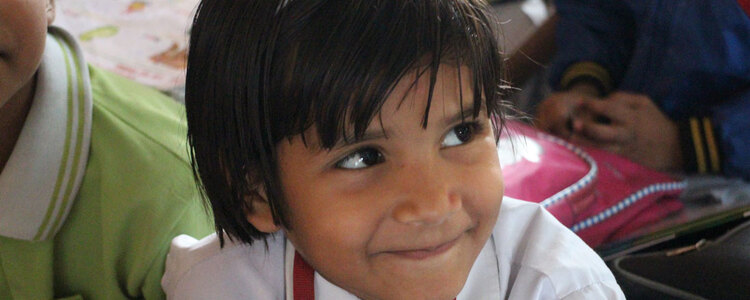
ABLE India Charitable Trust
ABLE Charities is an internationally registered non-profit organization that operates in the rural areas of Palwal and slums of Faridabad in India to facilitate education and healthcare for the grossly underprivileged strata of our society. From the time it was founded in 1993, the focus of ABLE Charities in the rural areas has been to serve poor women, especially widows, their children and orphans through affordable medical services, including eye cataract operations and dialysis treatment. Grants Awarded to ABLE by One Kind Act October 2025: Through funds raised at OKA Summer Ball 2025, a grant of £4000 was made to improve the daily living conditions, upgrade educational materials, provide better nutrition for girls aged up to 11 at Gurukul School, India. June 2025: Through kind donation made by Nitin Lakhani and Ritu & Tony Soni, a grant of £6500 was made to improve the daily living conditions, upgrade educational materials, provide better nutrition for girls aged up to 11 at Gurukul School, India. March 2025: Through funds raised through OKA Give A Child A Vision Appeal, a further grant of £3500 was made to enable Able to screen children from a disadvantaged background for eye defects, and the manufacturing and fitting of spectacles so these children that can then access education and fulfil their dreams. December 2024: Through funds raised through OKA Give A Child A Vision Appeal, a grant of £2500 was made to enable Able to screen children from a disadvantaged background for eye defects, and the manufacturing and fitting of spectacles so these children that can then access education and fulfil their dreams. October 2024: Through funds raised by OKA Associate Komal Bhagat for her 40th birthday, a grant of £4000 was made to enable Able towards screening a child from a disadvantaged background for eye defects, and the manufacturing and fitting of spectacles so these children can then access education and fulfil their dreams. March 2024: Through kind donation made by Ritu and Tony Soni and supplemented by OKA funds, a grant of £6500 was made to fund stationery and uniforms for orphan girls in India.3 October 2022: Through funds raised at the 2022 Prideview Cricket day event, a grant of £8000 was made to enable Able to carry out cataract surgeries in India.23 May 2022: Through funds raised at the Heroines & Vamps Ladies Night, a grant of £4000 was made to enable Able to carry out 133 cataract surgeries in India.17 February 2022: Through kind donations, a grant of £5000 was made to meet Dialysis costs of six patients (£3000) and of cataract surgeries (£2000).19 February 2021: At the hospital where ABLE carry
out cataract operations, ABLE have now set up a Dialysis Centre to treat
ill-affording patients with fatal kidney failure. Amongst other needs, they
require funds to set-up the main RO room and particularly to purchase RO
equipment that is vital for dialysis treatment. In memory of Raj
Bhogal’s brother, Belu, Raj and Mona Bhogal have kindly made a very generous
donation of £10,000 to fund ABLE's vitally needed RO room and equipment for
their Dialysis Centre. The RO room will be named the The Belu Bhogal RO Room. One
Kind Act are proud to have made a grant of £10,000 to ALBE for this work to
commence. 26 December 2020: A grant of £3,300 was made to
fund 2 months of care, food and education for 22 girls currently living at the orphanage
ABLE support. This was made as a result of Zoom Wine & Chocolate
Appreciation Fundraising Event held in Singapore. 25 October 2020: ABLE have embarked upon non-formal
Education Project for children living in the slums of Faridabad, India
where at least 1500 children in the age group of 6 to 14 years, of which 45%
are girls, do not attend school and indulge in rag picking, work related to
segregation / recycling of waste, etc. A grant of £10,000 was made to
support the Non-formal Education Project for children living in slums
in Faridabad. 06 November 2018: ABLE has its own multispecialty 100
bed hospital along with fully equipped Eye centre. They seek funds to support
cataract operations for up to 2000 poor old people to get their lost vision
back and to prevent the onset of blindness due to lack of affordability and
unavailabilty of medical services. The total cost of one cataract surgery
is Rs.2500/-(approximately 27 pound). ABLE CHARITIES have target of doing 2000
cataract surgeries in 2018-19. A grant of £6750 was made to carry out cataract
operations for 200 elderly people to regain vision/prevent blindness.24th September 2017: At the orphanage, ABLE seek
funds for the running cost of and regular expenses of food, residence, health
and education for these girls, which is estimated at approx. £75 per child per
month. A grant of £9000 was made to support 10 girls at the
orphanage. November 2016: ABLE runs an orphanage for up to 100
poor needy girls up to the age of 18 who have been picked by the police as
missing or have been handed over to them from government authorities. They
require funds to furnish a new shelter for orphan/slum children with beds,
mattresses, fridges and furniture. A grant of £2000 was made to support
orphan/slum children in India.
About One Kind ActOne Kind Act Change Communities and lives of others globally who suffer as a result of Poverty of Health, Nutrition and Education and may have Fallen Through The Net of the larger charities. Learn More here
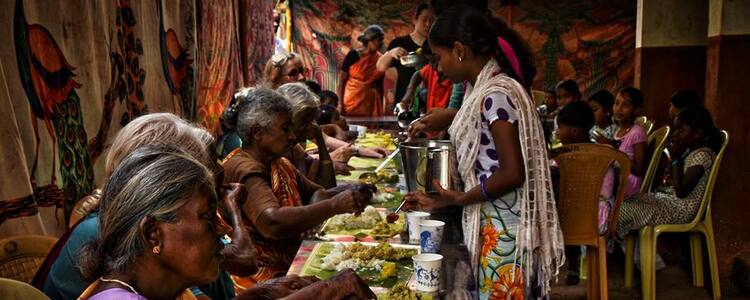
Punarnava
Punarnava Charitable Trust is wholly focused on improving the health, education and welfare of poverty struck villages on the outskirts of Coimbatore in Tamilnadu, South India, highlighting, amongst so many pressing demands, the need to feed the neglected elderly and provide a monthly free medical health camp. They specifically address: Relief of sickness. Every month they provide a free medical camp to ill villagers for whom this is the only access to medical care. The difference they make to the quality of life of the sick and diseased is inestimable. Diabetes, infectious diseases, blindness, strokes, arthritis are just some of the prevailing issues. Feeding 100 elderly neglected villagers daily. With increased urbanisation many elderly are left to fend for themselves with no family to take care of them. Many of them are blind, disabled or immobile. All of them are malnourished and painfully thin. They are too frail to work and would slowly starve to death if it wasn't for the wholesome, fresh, hot meal Punarnava delivers to them daily. Careful due diligence was done by an OKA associate who visited them. The incredible thing about their work is the minimal costs. There are no administrative costs at all as it is run by dedicated volunteers. Similarly the logistics, doctor's fees, identification process for eligibility is all free. This means that all the money donated goes directly to those that suffer most with no wasteful and unnecessary administrative costs. Grants Awarded to Punarnava by One Kind Act 30 January 2025: From raising funds at 2024 Garden Party, a grant of £15,500 was made towards the purchase of provisions and for the preparation of a daily midday meal for 100+ elderly villagers, as part of the continuance of Project Annam.17 August 2023: From raising funds by Prideview Group at their Cricket Cup Day and and from OKA funds, a grant of £12,500 was made towards the purchase of provisions and for the preparation of a daily midday meal for 100+ elderly villagers, as part of the continuance of Project Annam.25 July 2022: From a kind donation by Ritu Soni and from OKA funds, a grant of £3,000 was made towards the purchase of provisions and for the preparation of a daily midday meal for 100+ elderly villagers, as part of the continuance of Project Annam.7 February 2022: A grant of £8,000 was made towards the purchase of provisions and for the preparation of a daily midday meal for 100+ elderly villagers, as part of the continuance of Project Annam.27 August 2021: From funds raised through our India Covid Appeal, a grant of £2,500 was made towards provision of Ayurveda medicines and post covid support to families who have lost loved ones12 February 2021: As result of the kind donation from a kind
donor, a grant of £1,000 was made towards the purchase of provisions and
for the preparation of a daily midday meal for 100+ elderly villagers, as part
of the continuance of Project Annam, which is working under the strict
rules of Covid-19. 16 October 2020: A grant of £12,200 was made for the purchase
of vegetables, rice, coconuts and provisions and for the preparation of a daily
midday meal for 150 elderly villagers for the whole year, as part of the
continuance of Project Annam, which is working under the strict rules of
Covid-19. 19 October 2019: A grant of £14,320 was made for the purchase
of vegetables, rice, coconuts and provisions and to prepare daily Community
lunches for 100+ elderly for the whole year. 1 August 2018: A grant of £12,283 was made to provide food
and medical camp for 100 neglected poverty struck villagers for 1 year 19 June 2017: A grant of £11,500 was made to provide food
and medical camp for 100 neglected poverty struck villagers for 1 year
04 April 2016: A grant of £10,000 was made to provide food
and medical camp for 100 neglected poverty struck villagers for 1 year
About One Kind ActOne Kind Act Change Communities and lives of others globally who suffer as a result of Poverty of Health, Nutrition and Education and may have Fallen Through The Net of the larger charities. Learn More here
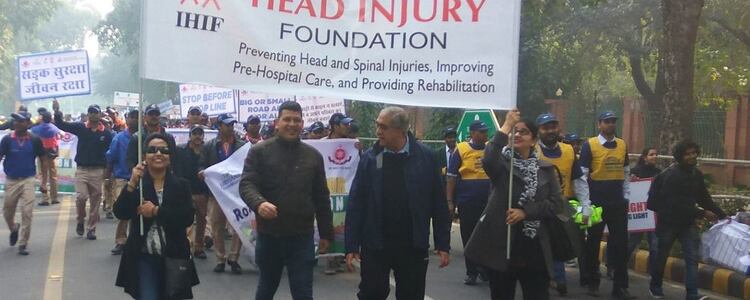
Indian Head Injury Foundation
Founded in February 2007 by His Highness Maharaja Gaj Singh of Jodhpur, the Indian Head Injury Foundation was the outcome of a father’s concern for his injured son. After Maharaja Gaj Singh’s son Yuvraj Shivraj Singh suffered a serious head injury during a polo match, the family was subject to countless medical procedures, numerous remedial opinions and many tough decisions. Seeing the state of India’s social and medical response to head injury accidents and brain trauma, the Maharaja started on a mission to build a comprehensive system for the head injury prevention through the education of road users, diagnosis and treatment of traumatic brain and spinal injury, and to provide physical and neurological rehabilitation to the victims of such unfortunate incidents. IHIF cater for the under-privileged sections of India's society after suffering life-changing injuries to the brain. They have rehabilitation centres in Jodhpur, Delhi ad more recently in Patna. Grants Awarded to IHIF by One Kind Act September 2024: A grant of £25,000 was made to for the procurement of a essential new equipment for better treatment of patients with brain injury at the Rehab centre in Delhi. 26 June 2023: A continuing grant of £8,000 was made to continue providing quality care to the underprivileged users of the Neuro Rehab Centre in Patna at almost no cost to them.21 June 2021: A continuing grant of £12,000 was made to continue providing quality care to the underprivileged users of the Neuro Rehab Centre in Patna at almost no cost to them.4 April 2020: A continuing grant of £21,480 was made
to continue providing quality care to the underprivileged users of the Neuro
Rehab Centre in Patna at almost no cost to them.21 June 2019: A grant of £905 was made that was
raised at a coffee morning held on 1st May (see EVENTS page for details) to
purchase a much-needed multi-activities work station for upper extremities
exercise. 7th February 2019: A further grant of just under £24,000
has been awarded towards the civil works, building, furniture and fittings of a
new Rehab Centre in Patna. It also includes the cost of essential new Rehab equipment;
a Paediatric Walker, a Tilt Table and a Functional Electronic Stimulation
Machine. The work in Patna is in full swing. OKA are HUGELY proud of the fact
that the new Rehab Centre in Patna will be entitled with SUPPORTED BY
ONE KIND ACT.IHIF hope to complete the project and perform the inauguration
in June 2019 to which OKA have been invited. 5th March 2018: A grant of £26,000 was made for the
treatment and rehabilitation of up to 30 trauma victims in rehabilitation
centres in Jodhpur and Delhi, India together with the provision of up to 50
active wheelchairs to those in need.
About One Kind ActOne Kind Act Change Communities and lives of others globally who suffer as a result of Poverty of Health, Nutrition and Education and may have Fallen Through The Net of the larger charities. Learn More here
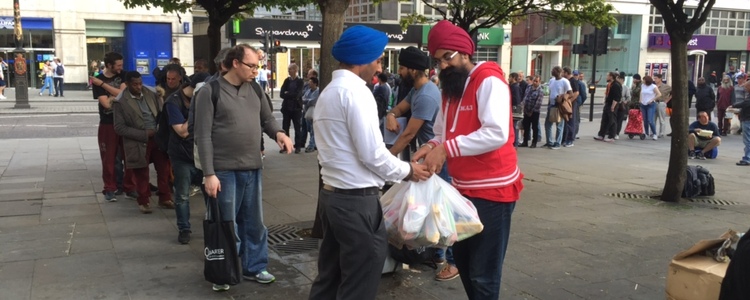
NishkamSWAT
NishkamSWAT is a 100% voluntary humanitarian-aid organisation founded in 2008 that look after the immediate needs of the street homeless. We serve at least 5000 meals a week in 24 locations in the UK, and 2 locations internationally, 32 times a week based on the concept of Langar (Free Community Kitchen) through our faith-based values of love, truth, compassion, forgiveness, contentment and humility. One outreach location in particular, Trafalgar Square in London sees at least 350 meals being served on some nights, 5 times a week. During these unprecedented times in light of the COVID-19 pandemic, we have seen an increase in service users which has increased the amount of food, refreshments, clothing and blankets/sleeping bags we serve.NishkamSWAT ProjectsHomeless Project - Serving 5000meals a week in the UKNishkam Healthcare - Serving 150 people a month with healthcare help/advice in Slough, Reading and at Trafalgar Square (people who do not have an address do not have access to the NHS in the UK)Project Recovery - A helpline for those suffering from drug and alcohol abuse and those supporting them (On Hold)Elderly Care Project - Visiting Elderly residents in West and East London (On hold)NishkamSWAT Help COVID-19 Free Mobile Langar Delivery Service (20th March 2020 - 31st July 2020) -50,000 meals delivered and served by volunteers and Sky Engineer Drivers across the UK to those who were vulnerable, isolated and shielding due to the COVID-19 Pandemic as well as various NHS staff members and hospitals tooNishkamSWAT Vaccine Service for the Homeless (Strand and Hounslow)NishkamSWAT Oxygen for India AppealGrants Awarded to NishkamSWAT by One Kind Act July 2025: With funds raised from Langar donations and One KInd Act and a kind donor, we have been able to award a grant of £1000 to help keep feeding the homeless and vulnerable suffering from food povertyDecember 2024: With funds raised from Langar donations and One KInd Act, we have been able to award a grant of £1000 to help keep feeding the homeless and vulnerable suffering from food povertyDecember 2024: With funds raised from 2024 Prideview Cricket Day and from OKA Xmas Appeal, we have been able to award a grant of £5000 to help keep feeding the homeless and vulnerable suffering from food povertyDecember 2024: With funds raised from Langar donations made by One KInd Act and Anju Malhotra, Mona Bhogal & Reeta Hussain and from extra funds raised by OKA for their Coffee Appeal, we have been able to award a grant of £2500 to help keep feeding the homeless and vulnerable suffering from food povertyOctober 2024: With funds raised from Ajay Khindria and Varsha Gulabivala's Langar, we have been able to award a grant of £1000 to help keep feeding the homeless and vulnerable suffering from food povertySeptember 2024: With funds raised by OKA Hunger Appeal, , we have been able to award a grant of £1000 to help keep feeding the homeless and vulnerable suffering from food poverty. February 2024: With funds raised for Mona Bhogal and Reeta Hosein's Langar, we have been able to award a grant of £1000 to help keep feeding the homeless and vulnerable suffering from food poverty. December 2023: With funds raised at One Kind Act's Xmas Appeal, we have been able to award a grant of £4000 to help keep supporting the homeless and vulnerable suffering from food poverty. September 2023: With funds raised at One Kind Act's Ladies Night event, we have been able to award a grant of £4000 to help keep supporting the homeless and vulnerable suffering from food poverty. February 2023: Through langars done by various supporters and the Hunger Relief Appeal, we have been able to award a grant of £1500 and £1000 to help keep supporting the homeless and vulnerable suffering from food poverty. December 2022: Through various supporters, we have been able to award a grant of £3000 to help keep supporting the homeless by providing Winter essentials over the Christmas.October 2022: Through funds raised at the 100km for Ukraine event, we have been able to award a grant of £3651 to continue supporting vulnerable families in the Ukraine with food supplies.July 2022: Through two generous supporters for OKA's Ukraine Appeal, we have been able to award a grant of £8000 to help with the setting up of a hot food permanent food kitchen in Ukraine.May 2022: Through the funds raised at OKA's Heroines & Vamps Ladies Event, we have been able to award a grant of £4000 to help provide support for the homeless with up to 2000 meals. April 2022: Through OKA's Ukraine Appeal, we have been able to award a grant of £3000 to help provide support for the displaced people of Ukraine with essential supplies through direct effort by SWAT volunteers.February 2022: Through kind donations, we have been able to award a grant of £1000 to purchase food for those suffering food poverty in the UK.December 2021: With OKA’s 2021 Winter Appeal, we have been able to award a grant of £2000 to purchase Clothing, Toiletries, Blankets and food items for the homeless.January 2021: With OKA’s continued appeal for funds to help SWAT, we have been able to award a grant of £1000 to allow supporting families with essential food supplies during the pandemic. This grant was been possible through the kind donation from our sponsor Prideview Group. November 2020: OKA have made a grant of £4200 to SWAT for funding 3 pallets of biscuits that will be used to feed the Homeless of London during these weeks up to Christmas 2020.October 2020: A grant of £3000 was made towards your purchase of a Van to facilitate SWAT's ongoing work in the community. The grant was funded through a donation of £3000 made by Balwinder Kapila to One Kind Act on behalf of the Aman Kapila Memorial Fund specifically in response to SWAT's appeal for the purchase of the Van. April 2020: SWAT have responded to the Covid-19 crisis is a very big way. As well as the normal regular feeding of the homeless, NishkamSWAT are providing a FREE MOBILE LANGAR SERVICE at this crucial time of need for over 65-year olds in isolation. They have also got involved in providing meals directly our brave NHS workers who constantly are risking their lives to help the very vulnerable and sick within hospitals. A grant of £3.750 has been made to provide meals directly to our brave NHS workers who constantly are risking their lives to help the very vulnerable and sick within hospitals. November 2019: A grant of £2,010 has been made to fund winter clothing packs for the homeless.February 2019: A grant of £500 has been made to fund the feeding of homeless on Sunday 17 February. Numerous members of the One Kind Act team were present to serve the food. OKA are very proud to donate a cheque for £10,000 to help towards the purchase of a new building for SWAT to operate from. They are currently renting but feel the need to lay their foundations as they have grown rapidly over the last 10 years. We presented the cheque on Sunday 17 February at the Strand, when many members of One Kind Act team were present to serve the food to the homeless who come every week to be fed their daily nourishment. OKA made a further grant of £500 to fund the feeding on Sunday 17 February.February 2019: A grant of £2,000 has been made to fund 100 sleeping bags and 100 hats and gloves for the homeless.August 2018: A grant of £1,460 has been made to provide a supply of biscuits to over 200 homeless people.March 2018: A grant of £1,663 has been made to provide a supply of biscuits to over 200 homeless people.December 2017: A grant of £2,200 has been made to fund 100 sleeping bags and 100 hats and gloves for the homeless.January 2017: On Sunday 29 January 2017, a dozen OKA affiliates and Sponsors, Meera & Harry Bhogal, joined SWAT for their regular slot in the Strand to feed the homeless. Hot food, dessert, cake and hot drinks were distributed along with blankets, scarves and hats to almost 200 deprived homeless. It was a particularly brutal day with icy driving winds and heavy rain. Everyone was huddled under hooded jackets, handing out food, trying hard to be upbeat and joyous. However, an OKA trustee looked sorry enough to be mistaken for one of the homeless and was promptly offered compassion and a warm meal!Despite of, or perhaps because of the weather, the homeless continued to stream through for almost two hours, grateful for the food, blankets and the warmth of volunteers who clearly cared about them as individuals.SWAT not only feed the homeless in UK through their volunteers' fundraising efforts, but also do other wonderful work like providing maternity care support for mothers in poverty in Kenya. May 2016: On one of the warmer evenings in May we’ve experienced this year, members of the OKA committee gathered at the Strand to offer help to an amazing charity SWAT (Sikh Welfare & Awareness Team). Initially set up as an organisation to primarily unite and transform financially disadvantaged communities, SWAT recognised in 2009 a desperate need to attend to so many people sleeping rough on the streets of London. It was then that they established their "Homeless Project" to reach out and feed the less fortunate in all different areas of the UK. London brightens up noticeably in periods of fine weather, no doubt apparent on that sunny evening in May as we noticed a greater bustle and liveliness on its streets. However, balmy weather does not disguise the real hardships of the homeless, who struggle daily without food and shelter. This uncertainty prevails throughout rain or shine. This was abundantly clear as we witnessed a queue of around 200 men and women waiting in line to be given their daily meal. We felt privileged that we could help. With an assortment of drinks, snacks, pre-prepared food and pizzas donated by the Pizza Express chain of restaurants, we were able to help alleviate some of their despair. In particular, one woman stood out. 8 months pregnant, she expressed immense gratitude for her next meal. She had nowhere else to go and though she was likely to be admitted into hospital for the birth of her child, she was under no illusion that she would return with her new-born to the unforgiving harshness of the streets of London. It saddened our hearts to hear this and we, as associates of OKA, felt humbled to be able to help. December 2015: A grant of £100 per month for 1 year (Total of £1,200) has been made to provide monthly supply of biscuits to up to 200 homeless people.About One Kind ActOne Kind Act Change Communities and lives of others globally who suffer as a result of Poverty of Health, Nutrition and Education and may have Fallen Through The Net of the larger charities. Learn More here
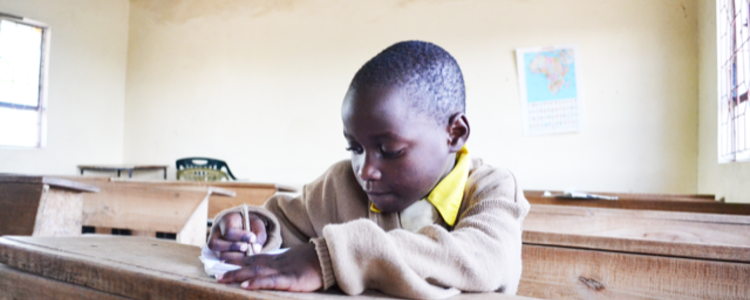
Made With Hope
Made With Hope believes every child living in rural Tanzania should have access to a quality education and they are achieving this by collaborating with rural Tanzanian communities to understand their barriers to education and finding solutions together. This includes building classrooms, collecting rain water for good health and bringing light to rural homes. Grants Awarded to MwH by One Kind Act September 2025: With funds raised by our Sponsor Partner, Prideview, at their Cricket Day 2025, grant of £8,000 was made to construct 8 rainwater harvesting tanks at Mzimuni School, Tanzania. September 2025: With funds raised at our OKA Summer Ball 2025, a grant of £8,000 was made towards a classroom construction at Mzimuni School, Tanzania. December 2024: With funds raised by generous donor, a grant of £10,000 was made towards the rainwater Rainwater Harvesting project at Muungano Primary School, Tanzania. September 2024: With funds raised by a Sponsor Partner, Prideview, at this year's Cricket Cup Day, a grant of £10,000 was made to for towards the renovation of 6 classrooms and a grant of £1,000 was made for installation of two classroom doors at Manyire school, Tanzania. May 2024: With funds raised by generous donor, a grant of £10,000 was made towards the renovation of 6 classrooms at Manyire school, Tanzania. December 2023: With funds raised by Shiv's Kilimanjaro Trek and from One Kind Act funds, a grant of £4,000 was made to continue supporting educational experiences for some of the most disadvantaged children in Tanzania. 13 July 2023: With funds raised by Kaushik Shak and Your One Wish at Mumbai-Goa Bike Ride and from One Kind Act funds, a grant of £15,000 Towards refurb of 9 classrooms at a very run-down Olderdenet School, Tanzania. 12 May 2023: One Kind Act feel immense gratitude towards our generous donor that has allowed us to make a grant of £22,947 towards renewing girls toilet facilities in a school in Manyire, Tanzania 7 February 2022: One Kind Act feel immense gratitude towards our generous donor that has allowed us to make the final grant of £254 towards the final touches to the building of new classrooms and a girls toilets block as part of MARURANI SCHOOL PROJECT, Tanzania 21 November 2021: One Kind Act feel immense gratitude towards our generous donor that has allowed us to make a further grant of £18,707 towards the next phase of rain water harvesting and instalment of new classrooms and a girls toilet block at a school in rural Tanzania. 21 September 2021: One Kind Act feel immense gratitude towards a generous donor that has allowed us to make a grant of £21,237 towards the next phase of rain water harvesting and instalment of new classrooms and a girls toilet block at a school in rural Tanzania. 19 July 2021: One Kind Act feel immense gratitude towards our very loyal and supportive Sponsors - Calcott Services for Children – who have recently risen to their call on social responsibility and made very generous donations to Causes we support. One such Cause is Made with Hope. Their donation of £5,000 will increase water accessibility to 629 students in Tanzanian schools through rainwater harvesting as part of their Mzmuni Water Project.9 October 2020: A grant of £12,595 to support the
children of rural Tanzania for better hygiene and education through 3 new
projects: Construct 5 handwashing stations and provide
soap for 1,843 children in 5 schools to prevent COVID-19 and hygiene-related
diseases which put children at risk and increase absenteeism Construct 14 girls toilets so they have a safe
and private place to use and do not feel the need to stay at home 5 days a
month (2 months a year) during their menstruation. Renovate 2 of Mshikamano Primary classrooms so
up to 316 children do not get wet in class during rainy season and have to stop
learning. 20 January 2020: Following on from the grant made in
September 2019 of £11,000 to build the foundations of 3 classrooms, a
further grant of £12,185 has been made to complete the project by installing
the roof, windows and doors, painting of the walls and filling them with
desks, ready for the students to use.10 September 2019: As a result of funds raised by
the Prideview Cricket Challenge Day 2019 and OKA Garden Party 2019, the
following grants have been made: ·
£11,000 to build the foundations of 3
classrooms ·
£13,280 to build numerous water harvesting tanks
About One Kind ActOne Kind Act Change Communities and lives of others globally who suffer as a result of Poverty of Health, Nutrition and Education and may have Fallen Through The Net of the larger charities. Learn More here
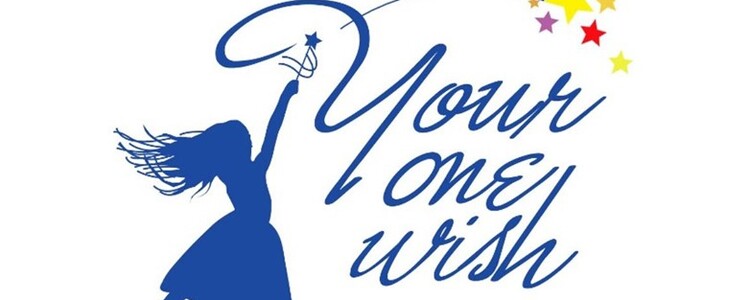
Your One Wish
Your One Wish is a UK based charity dedicated to raising funds and granting wishes for vulnerable and disadvantaged children and families around the world. Founded in 2015, Your One Wish is run by a small team of volunteers, using 100% of funds raised to help those in need. The charity raises donations by encouraging volunteers to take part in challenges such as the London Marathon, long-distance bike rides and mountain treks. Some of their recent local projects include the building of a sensory room in a newly built hospice ‘Noah’s Ark’ in Barnet; funding a 2-day camp for autistic children in Ealing; throwing a ‘celebration of life’ party for a seven-year-old girl who wasn’t expected to live for more than 48 hours; redecorating a paediatric treatment room; stocking the library of a local school with a host of new books, and providing medical equipment to community projects, to allow them to cater for children and young people with disabilities.During the pandemic crisis here in the UK, they have hand-delivered food to NHS staff; supplied iPads to hospitals so that patients could make calls to loved ones; distributed hundreds of laptops and tablets to children across the UK to allow them to continue with their learning from home throughout lockdown; provided supplies to food banks and co-ordinated the distribution of donated meals and supplies from generous businesses to Soup Kitchens and community hubs. Internationally, they have provided medical equipment to The One Heart Therapeutic Centre in Ethiopia, who care for severely disabled children, and they continue to send funds to them monthly to cover the cost of food, medication and bills. They have sent vital supplies to vulnerable children and families in Lebanon and Yemen, sourced oxygen concentrators and shipped them to those in desperate need in India to help with the third wave of Coronavirus, and have sponsored the education of a child from a family suffering hardship, in Mumbai.Grants Awarded to Your One Wish by One Kind Act 12 May 2023: A grant of £5000 was made through the funds raised from the Turkey and Syria earthquake emergency appeal to provide up to 20,000 meals to those affected by the earthquake disaster.13 February 2023: A grant of £5000 was made through the funds raised from the Turkey and Syria earthquake emergency appeal to deliver emergency aid of essential supplies. 16 June 2020: OKA have provided a grant of £1000 through the kind donation of CHRF to help families get through the COVID-19 crisis. 20 September 2021: Through our very successful fundraising at One Kind Act's annual flagship event, OKA Garden Summer Party 2021, we are proud to be able to have made a grant of £24,500 for their project of Rebuilding and refurbishment of a primary school in Adhi, Jalandhar, Punjab, India. These funds will allow the extension to the school through the construction of new classrooms and rebuilding existing classrooms. and provision of food, stationary, uniform and other necessary equipment to assist the children in achieving an education, in both the primary and the high school. A discretionary grant of £2,000 to provide garden furniture and a shelter for vulnerable young people leaving the social services care system in Hayes, Middlesex.About One Kind ActOne Kind Act Change Communities and lives of others globally who suffer as a result of Poverty of Health, Nutrition and Education and may have Fallen Through The Net of the larger charities. Learn More here
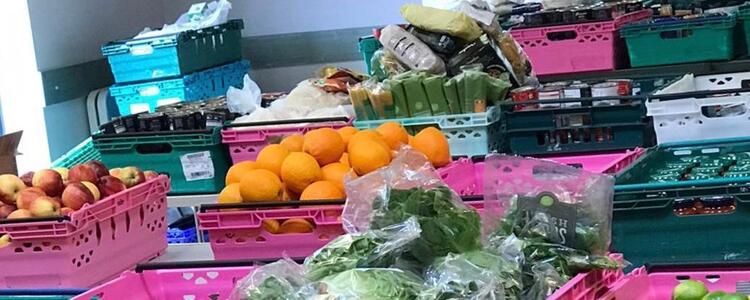
London's Community Kitchen
London’s Community Kitchen is a food charity that supports the community through the sad crisis of food poverty we are encountering here in the UK.Over this past year during the Covid crisis, LCK have established an extensive network of suppliers of food provisions who all work using a ‘zero waste, zero hunger’ model. Working with other charities, they operate as a food hub for cooked food and run weekly food markets to serve families and the vulnerable who suffer from extreme food poverty within the Boroughs of Harrow, Barnet and Brent. In addition, they serve local schools and support Outreach projects and many other community projects.Going forward, LCK will also be working on delivering education through Cookery projects. This will enable some of the most disadvantaged in our communities to gain an understanding of nutrition, qualifications and hence employment opportunities. Grants Awarded to LCK by One Kind Act 29 September 2025: With funds raised at OKA’s Summer Ball 2025, a grant of £50,000 was made for the construction of learning & IT area, media room and a podcast studio for their Youth project. 6 December 2024: With OKA’s 2022 Xmas Appeal and funds raised form the Prideview Cricket Day event, OKA have been able to award a grant of £5,000 to LCK to Christmas gifts for children living below the poverty line. August 2024: With funds raised by Kids Walking for Kids 2024 event organised by Vanita Rattan, OKA have been able to award a grant of £1,100 to LCK to allow them to support those suffering from food poverty in the UK and providing Xmas gifts to vulnerable children. December 2023: With funds raised by OKA Xmas Appeal, OKA have been able to award a grant of £4,428 to LCK to allow them to support those suffering from food poverty in the UK and providing Xmas gifts to vulnerable children. 17 August 2023: With funds raised by Prideview Group at their Cricket Cup Day, OKA have been able to award a grant of £3,000 to LCK to allow them to carry on with helping the vulnerable and homeless suffering with food poverty in the UK. 17 August 2023: With funds raised by OKA's Ladies Night, OKA have been able to award a grant of £5,000 to LCK to allow them to carry on with helping the vulnerable and homeless suffering with food poverty in the UK. 10 February 2023: With OKA’s Hunger Appeal, OKA have been able to award a grant of £1,000 to LCK to allow them to carry on with helping the vulnerable and homeless suffering with food poverty in the UK. 6 December 2022: With OKA’s 2022 Xmas Appeal, OKA have been able to award a grant of £7,500 to LCK to provide hot meals and Christmas gifts for children living below the poverty line. 17 October 2022: Through the funds raised at 2022 Prideview Cricket Cup Day, a grant of £8,000 was made towards purchase of bags of Fruit and Vegetable bags for children at 12 schools in Harrow for a period of 4-6 weeks. 13 July 2022: With OKA’s Hunger Appeal, OKA have been able to award a grant of £2,500 to LCK to allow them to carry on with supporting people suffering food poverty in UK.7 February 2022: With OKA’s LCK Appeal, OKA have been able to award a grant of £4,000 to LCK to purchase food for those suffering food poverty in the UK.21 December 2021: With OKA’s Afghan Appeal, OKA have been able to award a grant of £1,500 to LCK to purchase Clothing, Toiletries, Blankets and food items for the Afghan Community.10 December 2021: With OKA’s 2021 Winter Appeal, OKA have been able to award a grant of £4,000 to LCK to purchase Christmas gifts for children living below the poverty line. 17 September 2021: Their recently launched Plant To Plate Project provides an 8 week curriculum at schools to show children how to grow their own nutritious food and cook with what they have grown. A grant of £20,000 from the funds raised by our Sponsor Partners Prideview Group (£5,000) and Calcot Services for Children (£15,000) will procure 10 Cooking Stations for use by children and adults as part of this Good Nutrition Programme.10 June 2021: With OKA’s new LCK Appeal launched in January, we have been able to award a grant of £1,000 to LCK to allow the purchase of essential food supplies for desperate families during the pandemic. This grant has been made possible through the kind donations of all our Supporters for this LCK Appeal. 4 May 2021: With OKA’s new LCK Appeal launched in January, we have been able to award a grant of £1,000 to LCK to allow the purchase of essential food supplies for desperate families during the pandemic. This grant has been made possible through the kind donations of all our Supporters for this LCK Appeal. 5 April 2021: With OKA’s continued appeal for funds to help LCK, we have been able to award a grant of £4,620 to allow supporting families with essential food supplies during the pandemic. This grant has been possible through the kind donations from 1. The 'Run 100K for LCK' Challenge amazingly completed by Karun & Aditi which raised £1642 and which OKA topped up to £2000 from our own reserves. 2. Mishal Shah of £500 which was then matched by Goldman Sachs to make up to £1000 3. Supporters raising £810 which was then matched by Barclays Bank to make up to £1620. 5 April 2021: With OKA’s new LCK Appeal launched in January, we have been able to award a grant of £1,000 to LCK to allow the purchase of essential food supplies for desperate families during the pandemic. This grant has been possible through the kind donations of all our Supporters for this LCK Appeal. 3 March 2021: With OKA’s new LCK Appeal launched in January, we have been able to award a grant of £1,500 to LCK to allow the purchase of essential food supplies for desperate families during the pandemic. This grant has been possible through the kind donations of all our Supporters for this LCK Appeal. 2 February 2021: With OKA’s new LCK Appeal launched in January, we have been able to award a grant of £1,500 to LCK to allow the purchase of essential food supplies for desperate families during the pandemic. This grant has been possible through the kind donations of all our Supporters for this LCK Appeal. 24 January 2021: With OKA’s continued appeal for funds to help LCK, we have been able to award a grant of £3,120 to allow supporting families with essential food supplies during the pandemic. This grant has been possible through the kind donations from our sponsor Prideview Group, from our supporters and from the noble efforts on part of OKA committee members (Naina Chohdha for the Xmas Appeal and Reeta Hosein From us to You Appeal) and from supplementary funds out of OKA’s own reserves.22 November 2020: OKA have made a grant of £1000 to purchase food supplies for OKA Langar Day held at LCK on 27 November 2020. 15 November 2020: OKA have made a grant of £8550 to LCK towards their Winter Appeal. This is part of their Community Outreach Project in Harrow to help support the Homeless on the streets, Shelters, Support houses, Women in Refuge and Socio-Economically Deprived Children. The monies will be used towards providing Winter Clothing packs and Children Xmas Food packs. 2 November 2020: OKA have made a grant of £17680 to LCK to purchase a much-needed van for the distribution of food to the vulnerable and homeless affected by the Covid-19 pandemic. These funds were raised as a result of a rigorous government grant application. 8 October 2020: In continuation of the support OKA wish to give LCK, we have made a further grant of £6000 (which includes £500 from funds received from Lloyds Bank Foundation under their Staff Matched Giving scheme for COVID-19) to help them towards maintaining the food supply they provide through home deliveries and food market for the vulnerable, homeless and the marginalised people of our Harrow community during this Covid crisis. 3 July 2020: In continuation of the support OKA wish to give TRJFP/LCK, we have made a further grant of £1000 to helping them towards the hundreds of food parcels and local community cafe they provide for the vulnerable, homeless and the marginalised people of our Harrow community. 9 June 2020: In continuation of the support OKA wish to give TRJFP/LCK, we have made a further grant of £400 to helping them towards the hundreds of food parcels and local community cafe they provide for the vulnerable, homeless and the marginalised people of our Harrow community. 23 May 2020: In continuation of the support OKA wish to give TRJFP/LCK, we have made a further grant of £1350 to helping them towards the hundreds of food parcels and local community cafe they provide for the vulnerable, homeless and the marginalised people of our Harrow community. 23 May 2020: In response to the pledges made for TRJFP at last year's Child of Mine Ball, a grant of £5,440 has been made to TRJFP/LCK. It may be the case that in the face of the Covid-19 pandemic, the use of the funds will follow the general principles of food poverty rather any exact purpose discussed at the time of the Ball. OKA feel reassured that the funds are being directed to where the immediate need arises during this Covid crisis; to provide the hundreds of food parcels and local community cafe they provide for the vulnerable, homeless and the marginalised people of our Harrow community. 20 April 2020: TRJFP have responded to the Covid-19 crisis is a very big way. As well as running their Burnt OAK project, TRJFP have set the London Community Kitchen (LCK) in Harrow through the support of Harrow Council who have provided them very good premises. They have been enlisted onto the Harrow council “mini cobra committee” and have been given full access to the Council’s fleet of vans and social workers to help distribute hot food and parcels to the needy. TRJFP founder, Taz Gaffar, has been nominated to lead the distribution. TRJFP find themselves to be the only Hub currently operational in the Borough of Harrow. They are truly overwhelmed with the demands upon them; they are supplying on an average of 120 families with food provision daily as well as supporting several organisations including, Mind, Men cap, HAD, Relief, Harrow Care Homes and Northwick Park Hospital. OKA have made a grant of £3500 to purchase long life food products, PPE and packaging for the distribution of food to residents defined as vulnerable in the Harrow area. 11 March 2020: A grant of £3000 was made to purchase and repair kitchen equipment required for the Pay As You Go cafe at TRJFP in Burnt Oak, NW London.14 December 2019: A grant of £1500 was made from funds raised at the Ethical Catering event held by OKA Associate, Ritu Soni, to support the local impoverished community of Burnt Oak, NW London.28 November 2019: A grant of £4000 was made from funds granted by the Willesden Green Swaminarayan temple to buy Christmas presents for the children of the local impoverished community of Burnt Oak, NW London. 10 November 2019: A grant of £5000 was made from funds raised at the 2019 Prideview Cricket Cup Challenge Day to support the local impoverished community of Burnt Oak, NW London. 7 June 2019: A grant of £3500 was made from funds raised at various recent OKA events. The monies will be used to create storage space at the Harrow Cafe project, purchase kitchen equipment and signage for the Barnet cafe, and for general training of volunteers in the kitchen in Basic Food and Hygiene. 10 December 2018: OKA were very clear we wanted to help source xmas presents for the children of low-income families in Burnt Oak being suported by TRJFP. So OKA Associates Alisha Malhotra and Ritu Soni went out on a shopping spree to buy £300 worth of presents. OKA are proud to be able to help towards making Christmas a time of peace and love for those here in the UK in desperate need. 29 July 2018: A further grant of £150 was made as a result of a fundraising initiative by Hilton HQ in celebration of the UN World Day for Cultural Diversity. Hilton HQ held an international bake sale to raise funds for The Real Junk Food Project. See further details on our Event page. Furthermore, Hilton and TRJFP have joined hands in launching the first of their Bistro nights, when they served a 3-course meal created entirely from rescued food. It is so heart-warming that OKA have been able to facilitate a new partnership that will help towards the future success of this noble efforts by TRJFP in north west London. 24 September 2017: A further grant of £2000 has been made to complete the expenses for the much-needed van to collect vast quantities of available provisions from local major food retailers. 23 June 2017: A grant of £10,000 has been made to purchase a much-needed van to collect vast quantities of available provisions from local major food retailers. These provisions are then being made available to needy people in the local community at a pop-up shop in north west London. About One Kind ActOne Kind Act Change Communities and lives of others globally who suffer as a result of Poverty of Health, Nutrition and Education and may have Fallen Through The Net of the larger charities. Learn More here
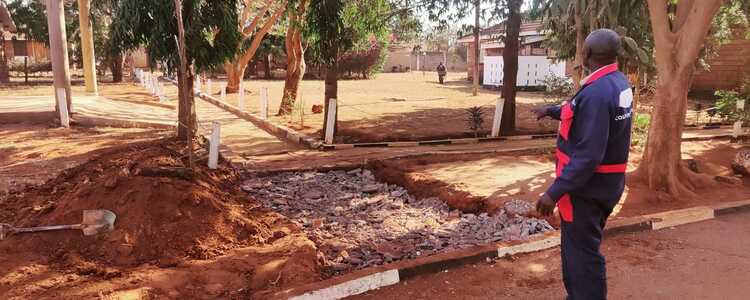
Global FICCS
The Global Foundation for Cardiac and Children’s Services (Global FICCS) provides both medical and educational services to the under-served communities of East Africa. Medical initiatives: FICCS provides charity heart surgeries and follow-up care, free health screenings for women & children, medical equipment, medicine and first aid kits, training symposiums for Kenyan cardiologists & nurses and biomedical engineer training to utilize and maintain donated state-of-the-art equipment. Education initiatives: FICCS provides medical school and nursing school scholarships to aspiring Kenyan students, began to lay framework for a cardiology-focused graduate medical education program at local hospitals, supports 7-week job skills training programs and donates uniforms, school supplies, computers and medicines to local elementary schools. The Global FICCS Women’s Centre: This is a space for FICCS affiliated programs to educate themselves on topics such as physical education, health topics affecting young women, offers internet access, a classroom, kitchen, work out machinery, speakers, medical evaluations, and meals. This space was created to have a home base for FICCS and a place where the young women in the programs can seek guidance, counselling, and empowerment.Grants Awarded to Global FICCS by One Kind Act 13 February 2023:A grant of £18,605 as 2nd instalment was made for Makindu renal unit programme in Kenya for their water treatment plan and Dialysis machines, and start up equipment with consumables.2 November 2022: A grant of £18,695 as 1st instalment was made for Makindu renal unit programme in Kenya for their water treatment plan and Dialysis machines, and start up equipment with consumables.September 2019: Global FICCS also works with Compassionate Hands with whom their key objective is to support and enable girls, women and underprivileged children from marginalised communities in Kenya through two key focus projects:1. Supporting a children’s home close to Nairobi (Ruai), whose main focus is providing a home for children with diseases and disabilities such as Cerebral Palsy2. Supporting a Maasai community in a remote location in Nairobi, by providing schooling, supplies and other necessities, to enable the community to grow, developand become self reliable, & sustainable.OKA granted £12,500 to Global FICCS towards the construction of a new dormitory at the children’s home.About One Kind ActOne Kind Act Change Communities and lives of others globally who suffer as a result of Poverty of Health, Nutrition and Education and may have Fallen Through The Net of the larger charities. Learn More here
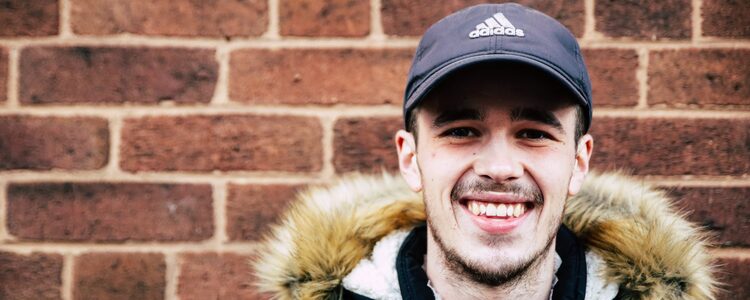
LandAid
Every year, tens of thousands of young people become homeless. Sadly, council services are often unable to support more than half of the young people across the country that so desperately need a helping hand. Consequently, many are forced to sleep in overcrowded hostels, on people’s sofas or even on the streets. LandAid is the property industry charity working to end youth homelessness in the UK. It brings together remarkable businesses and individuals across the property and wider built environment industry to fulfill ESG goals through supporting projects delivering life-changing services for 16–24 year-olds experiencing homelessness. By awarding monetary grants and arranging free property expertise through their Pro Bono Programme, LandAid invests where lasting community impact can be achieved. LandAid receives no government funding. All monetary grants are generously provided through the property and wider built environment industry. This includes long term partnerships, individual donations and fundraising through LandAid’s flagship sponsored events throughout the year. The incredible support and continuing commitment from the industry enables homelessness charities across the UK to provide safe, secure accommodation within a supportive environment for young people, helping them reach their full potential and look towards a brighter future.Help One Kind Act to support the young and vulnerable homeless in the UK.Grants Awarded to LandAid by One Kind Act October 2024: From raising funds by Prideview Group at their Cricket Cup Day 2024, a grant of £10,000 was made towards the support and provision of shelter to the homeless youth in the UK.15 August 2023: From raising funds by Prideview Group at their Cricket Cup Day 2023, a grant of £10,000 was made towards the support and provision of shelter to the homeless youth in the UK.About One Kind ActOne Kind Act Change Communities and lives of others globally who suffer as a result of Poverty of Health, Nutrition and Education and may have Fallen Through The Net of the larger charities. Learn More here

